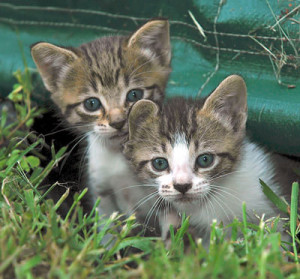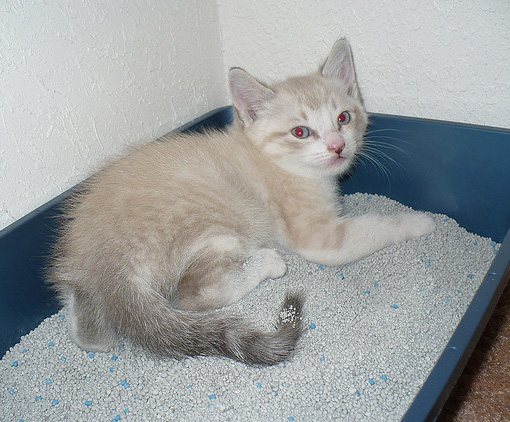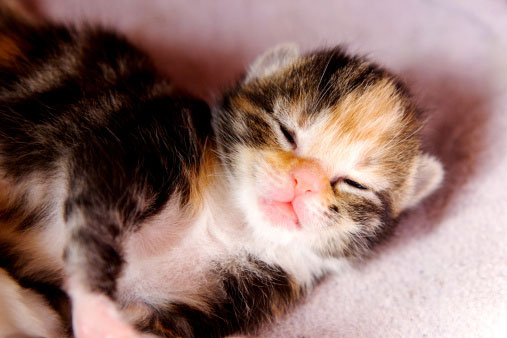Providing proper kitten health care is of the utmost importance, whether you’re new to raising kittens or you’re a seasoned professional.
After all, no matter your experience level, it’s always scary when you’re dealing with a sick pet.
From preventative care to veterinary visits, we will dive into the top 10 kitten health topics that you should be aware of as your kitten continues to grow.
Kitten Health Tip #1: Know Your Health Signs
A healthy kitten will have bright, clear eyes, firm and pink gums, and a glossy coat.
He will be alert and energetic and have a healthy appetite.
If he seems lethargic, or is not eating or drinking (or doing so too much) it is a good idea to see the vet.
Another sign of a sick kitten is the appearance of the second eyelid.
This is the extra protective pink eyelid that usually is not visible, but when he’s sick sometimes you will see it covering the inner corners of his eyes.
If you just adopted a kitten and brought him into a new strange place (your home) don’t worry if he doesn’t want to eat right away. He may just be nervous.
Give him some time to adjust, but if he doesn’t eat after five or six hours, see if you can entice him with something extra delicious.
If he still will not eat, it would be prudent to call your vet, as this could indicate a health issue.
In the case of very tiny or newborn kittens, a kitten health sign is they will be plump and heavy for their weight, strong enough to inch their way towards their mom, and they will not mew constantly.
Health Tip #2: Provide Daily Care to Prevent Illness
 Once you know what a healthy kitten looks and acts like, help them stay that way!
Once you know what a healthy kitten looks and acts like, help them stay that way!
Providing kitten health care involves inspecting their coats, ears, eyes, teeth, and bathroom habits continuously to be on the lookout for changes.
When you can catch illnesses or injuries early, recovery will be quicker.
Just make sure you consult your veterinarian with your kitten health questions if any of these changes are worrisome.
Daily care also means selecting a quality kitten food, and possibly even a safe digestive supplement like Fortiflora.
Kitten Health Tip #3: Follow the Vaccination Schedule
Up until about 8 weeks old, kittens get all the immunity they need from their mothers.
After this point though, it is up to you to protect them against diseases that they are susceptible to, such as feline leukemia.
With very little variation, veterinarians will have a vaccination schedule that kittens are to follow, which begin at 6 to 8 weeks old and end at 12 weeks.
The series (usually 3 visits for several different vaccines) is very important for ensuring and maintaining kitten health.
This is especially true if you found a stray kitten, or adopted one from a shelter as you have no way of knowing what he may have been exposed to.
If you adopted an older kitten, your vet will alter the vaccination schedule to accommodate his age.
Health Tip #4: Know When to See the Vet
This is something that you will second-guess yourself less about as you get more experienced with raising kittens.
It’s almost like being a new mom, wanting to overreact over the smallest hiccup!
However, if you have a gut feeling that something is wrong, it is better to act on it than not and wish you had.
Some things you can just keep an eye on.
For example, when your kitten is vomiting.
As long as she is throwing up food, grass, a hairball, or a bitter bug that didn’t agree with her tummy, she should be OK.
If she has the dry-heaves or continuously vomiting liquid or just her own saliva, take her to the vet right away.
Likewise, the presence and treatment of kitten diarrhea can be an isolated event.
However, there are frustratingly many potential causes of diarrhea in kittens and it is dangerous to let this go on without seeking veterinary intervention.
Kittens can become dehydrated quickly and easily, so continuous diarrhea in your kitten is dangerous.
Other examples are if your kitten got a light scratch from a sibling or other resident cat, he is probably fine without veterinary care, but a puncture wound from a cat bite or a scratch on or near the eye needs medical attention right away.
Kitten Health Tip #5: Protect Against Common Kitten Illnesses and Diseases
The most common and deadly diseases in kittens and cats are effectively treated with the vaccinations that are administered in kitten hood.
These include feline upper respiratory disease (Feline Viral Rhinotracheitis) feline calicivirus, Feline leukemia, and feline AIDS.
As kittens mature into older cats, they are susceptible to kidney and urinary tract problems.
Now, you don’t have to be able to diagnose any of these specific diseases in your kitten, but this is related to tips #3 and #4 above; it is always important to keep your vaccination appointments, and to watch out for such warning signs as listlessness and changes in appetite or bathroom habits.
Health Tip #6: The Importance of Spaying and Neutering
While not exactly a kitten health issue, it is important to understand that kittens can enter sexual maturity much earlier than most people realize!
Female kittens are able to get pregnant as early as five months old.
This is especially good to know if you are raising more than one kitten of different sexes–if you adopted a brother and sister kitten, don’t think that they won’t act on their impulses just because they’re related!
Even if you have just one kitten that you plan to keep indoors, having a female enter her heat cycle several times a year, or a male that could begin scenting around your house is a good reason to have them spayed and neutered!
Health Tip #7: Be Aware of Behavioral Changes
A sudden or gradual change in personality is something to definitely keep an eye on, especially if there is no outside reason to cause this (like a new pet in the home or visiting family.)
If he is listless, grouchy, reclusive, or suddenly shy there could be a physical or medical kitten health issue.
It would be wise to call the vet in this case. It could be a mild upset tummy, but you never know without a professional veterinary examination.
Read more about common signs of depression and anxiety in cats.
Health Tip #8: Prepare for Potential Emergencies
Any serious injury or illness needs to be treated by a veterinarian, but when every second counts, you need to know how to respond to these circumstances during the immediate aftermath of the incident.
Our ebook Raising Kittens: A Care Guide for the New Kitten Owner has a chapter on emergency preparedness, and can help you save your kitten’s life during a crisis.
Kitten Health Tip #9: Protect Against Parasites
 The most common ailments affecting young kittens health are worms and other internal parasites, as well as fleas, ear mites, and even ringworm.
The most common ailments affecting young kittens health are worms and other internal parasites, as well as fleas, ear mites, and even ringworm.
If you suspect any of these nasty beasties are affecting the health of your kitten, make a veterinary appointment as soon as possible for treatment, and try to keep him away from any other pets.
Symptoms of internal worms can be diarrhea, but sometimes there are no signs and only a test to confirm at the vet’s office.
It is easily curable. You will be clued in to the presence of fleas and ear mites if your kitten is continuously scratching.
Ringworm is highly contagious and transmittable to people and other pets.
It is characterized by flaky skin, hair loss in patches, and scabs. Until treatment can be given, keep him in isolation and handle with latex gloves.
And finally…
Kitten Health Tip #10: Insurance and Microchipping
Again, while not directly a kitten health issue, both of these are optional precautions to take with your kitten.
They should be given some thought, as these options are becoming more commonplace among pet owners and recommended by vets and animal care societies as well.
With the high cost of medical care for kittens and cats, many pet owners are looking more closely at affordable pet health insurance options.
Given that even one surgery can run in the hundreds and even over a thousand dollars, it makes sense for many to have this kitten health insurance in place ahead of time.
It is also much more of a standard procedure for kitten owners and animal shelters alike to microchip pets before adoption.
It is inexpensive, easy, and can be a great help towards being reunited with a lost pet.
All pets taken in to shelters as strays are checked for microchips, so this is another idea definitely worth consideration in the case that you become separated from your kitten.
See related cat health articles on this site: Cat Health at “Best Cat Art”







